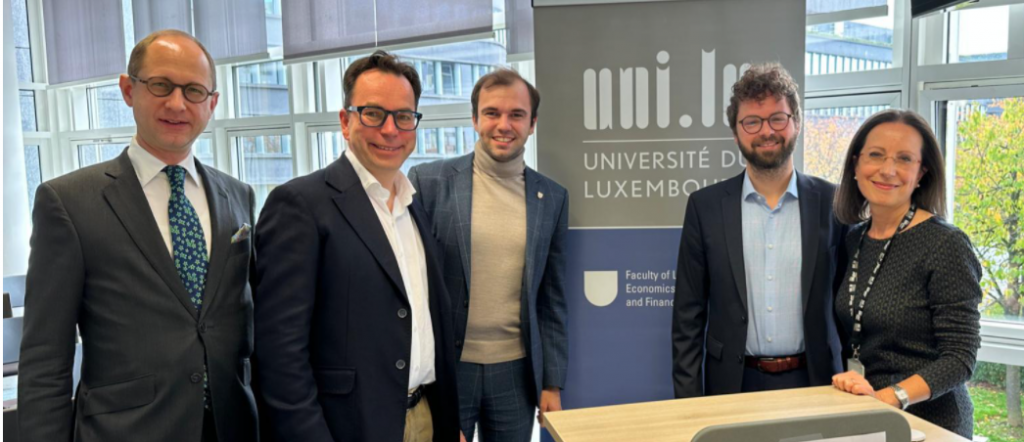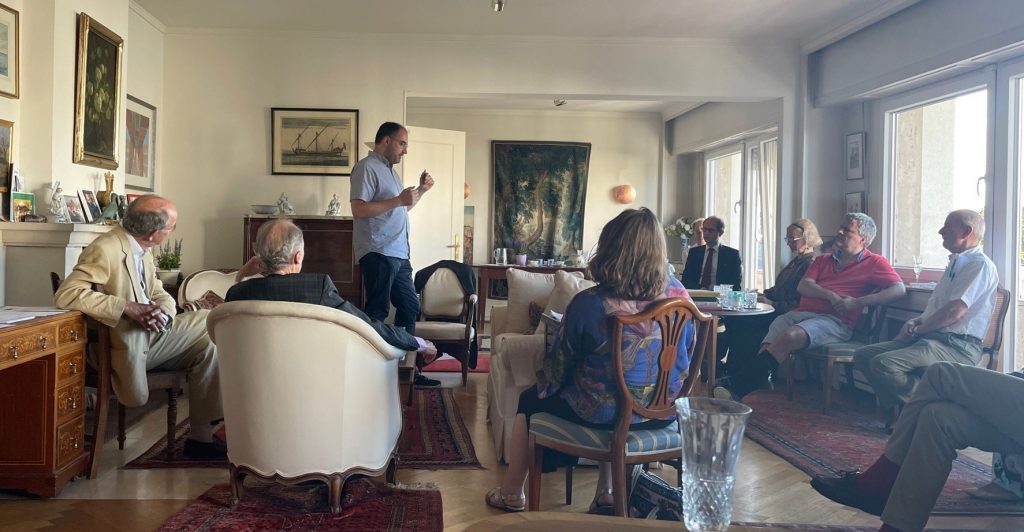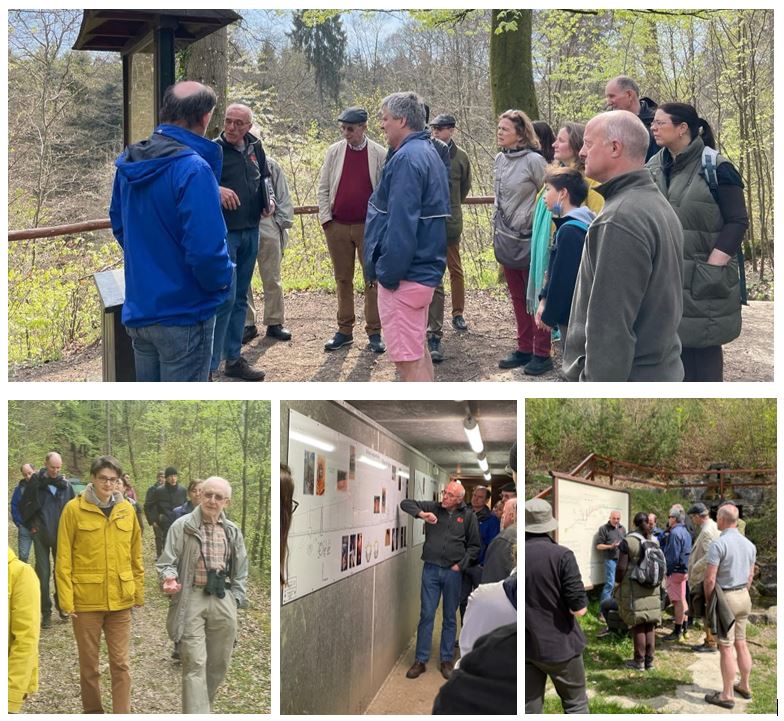Last December we had our traditional Christmas evening, at Grand Hotel Cravat. After a welcome drink at the bar “Le Trianon” we visited the Luxembourg Christmas Markets in the old town. Always a treat.
Author: JvB
Second OUSL-FDEF Law Talk
Chamber Music, Atonal: How the Structure of the CJEU Affects the Jurisprudence on the Free Movement of Goods
Professor Stefan Enchelmaier (Lincoln College, Oxford) presented his recent paper ‘Chamber Music, Atonal: How the Structure of the CJEU Affects the Jurisprudence on the Free Movement of Goods’. In his paper and presentation, Professor Enchelmaier illuminates the composition and structure of the CJEU and considers some of the shortcomings in the case law of the Court on the free movement of good. In particular, he highlights the lack of discursive reasoning and uncertainty as to what constitutes a restriction of free movement. One of his claims was that this could be explained as a consequence of the peculiar structure and operation of the Court. A fruitful discussion with academics, CJEU members, and practitioners, including several OUSL members, followed the presentation. We thank the FDEF Law Faculty for another successful joint event, particularly Professor Herwig Hofmann and Dr Felix Pflücke.

Thomas Reyntjes (OUSL member), Dr Felix Pflücke (OUSL member, co-organiser), Dr Susana Munoz (FDEF Law, co-organiser), Katia Volodine (OUSL member), Professor Stefan Enchelmaier (Oxford University, speaker), Professor Herwig Hofmann (OUSL member, co-organiser)
Joint Law Seminar: 60 Years of Free Movement of Goods Litigation’ (1961-2021)
On November 10th, we had a joint event with the University of Luxembourg Law Faculty, organised by two of our members, Professor Herwig Hofmann and Dr Felix Pflücke. Professor Jan Zglinski, LSE Assistant Professor and Research Fellow of the Oxford Law Faculty Institute of European Comparative Law, presented his interdisciplinary paper ‘60 Years of Free Movement of Goods Litigation’. His empirical paper examined all of the Court of Justice free movement of goods cases and highlighted developments which will make a big splash in the field of EU Law.
The talk followed a lively Q&A and discussion, providing additional food for thought. We thank the organisers and the University of Luxembourg for this joint event.

William Howard Piano Recital
On 21 October, OUSL members enjoyed a piano recital by Oxonian William Howard, playing mostly romantic pieces, at the Centre Culturel of the European Institutions

Notes from Oxford
Last September 16th, only days after the Fresher’s dinner, committee vice-chair David Clark attended the Meeting Minds Weekend in Oxford and prepared a report on the news and highlights.
One of these was a meeting with the Vice-Chancellor, Dame Louise Richardson, who is completing her term at the end of the year. She has been a tremendous Vice-Chancellor and has taken Oxford to the top of the rankings consistently. On the 18th September the Times published their worldwide ranking of universities placing Oxford as no 1!
Please read David’s report, with notes Research, Brexit, admissions (EU admissions down by more than 50%), post-graduate studies, and Woke vs. the Cecil Rhodes a.o.
We congratulate the University with it’s no. 1 position and thank David for his interesting report.
Fresher’s Dinner
Last September 13th we had our annual fresher’s dinner. Enjoying drinks and a wonderful Mezze dinner at Chiche!, we got to know four freshers soon heading to Oxford, to start their studies. The exchange of stories, tips and ideas was so engaging that once again we forgot to make any pictures!
The dinner is traditionally attended by committee members, and invite, appart from the freshers, practice interviewers, and current students. So we look forward to seeing the current freshers again next year to get to know their successors in 2023.

Annual Cricket-Picnic-Pimms-BBQ-Croquet event
One of the highlights of the year was the annual Cricket-Picnic-Pimms-BBQ-Croquet event (for lack of a better name) together with the Cambridge Society at the Schuman Farm and Oval. The event was once again a great success.
Our host-criquet coach Adrian Wykes had invited the Trois Frontières Cricket Team, to teach and coach Oxford and Cambridge participants and the tricks and rules of the game of wickets, stumps, runs and overs.
Similar to last year, the Pimms was prepared by Apricot Wilson, the BBQ by Steve Brabbs, and Fanny Dedenbach set up the croquet course. We thank them for once again making the event a very enjoyable get-together.
The feedback from the Oxonians left your webmaster regretting that he could not make it this year, courtesy of Covid, and looking forward to the 2023 edition.
A fuller account of the event can be found on the website of our friends from the Cambridge Society: http://www.cambridge.lu/

AGM and Talk about Electoral Systems
On June 14th, we had our Annual General Meeting. After the reports of our Chairman, Treasurer and Auditor, and the discharge of the outgoing committee and and auditor, we voted in our new Committee. Peter Munro will re-join the committee as Co-Chairman, Jan Könighaus being the other Co-chairman. They will take over from David Clark who led the OUSL through many successful years. David will remain active on the committee, which will also be strenghtened by our new Member Lidiya Cherneva. Mette Ahlefeldt and Harriet Hansen-Stone will step down however. We thank them gratefully for their commitment during the event-ful past years.
After the formalities, we enjoyed a talk by committee member Dan Schmit, who gave an overview of the different electoral systems in Europe. We learned about the purely proportional system (e.g. Netherlands, Denmark), regional representation of constituencies (UK), two-round voting (currently happening in France), and single transferable vote elections in Scotland, Wales and Northern Ireland. We saw that German voters cast two votes, one direct vote and one for a party or list. Of course we also reviewed the Luxembourg System, where voters receive as many votes as there are candidates in their constituency.
A lively Q&A and discussion followed, as is usual at OUSL meetings. We thank David and Marilyn Clark for their hospitality, and the drinks and snacks they prepared for the very enjoyable AGM.

Oxford and Cambridge Benelux and Rhineland Reunion 2022
The Oxford University and Cambridge University Societies in Luxembourg organised a successful reunion weekend in Luxembourg for alumni of the Universities in the Benelux and Rhineland where there are active alumni societies for the two Universities.
Events kicked off on the evening of Friday 6th May with a wildly successful Brazilian party at Maria Bonita in the Rives de Clausen. The following morning a somewhat more sober conference on the EU Luxembourg–based institutions was held at the Cercle Cité. Speakers included Ian Forrester, former Judge of the General Court, Geoffrey Simpson, Director of Audit Quality and Audit Methodology at the European Court of Auditors and Francis Carpenter, former Secretary-General of the European Investment Bank and CEO of the European Investment Fund. All speakers were informative and entertaining and provided exceptional insight into their respective institutions. The conference was sponsored by Clifford Chance.
Tours were arranged around the historic centre of Luxembourg and its fortifications as well as to the Mudam and Dräi Eechelen museums. There was a marvellous exhibition of paintings by black British artist Lynette Yiadom Boakye which runs till September. Dr Dan Schmit (MPhil, Oxon) a staffer at the Luxembourg Chamber of Deputies gave a tour of the Chamber and a talk on the Luxembourg political institutions. Professor Alan Wirth gave a superb concert of baroque organ music at the Church of St Michel. The ancient cities of Oxford and Cambridge would have been hard-pressed to match the beauty and serenity of the surroundings and the music.
The day ended with a black-tie Gala Dinner for 88 people at the Cercle Munster which was opened by a Latin grace spoken by Oxford graduate David Weis. Special guest Martine Reicherts, president of Luxembourg’s Fonds National de Recherche, gave an address on Innovation in Luxembourg. We were also honoured by the presence of the Deputy Ambassador of the United States, Casey Mace and his wife Anne. Mr Mace proposed a toast to the Transatlantic Alliance and spoke briefly of how the Ukrainian crisis has reinforced the need for transatlantic friendship. David Clark, Chair of the Oxford Society proposed a toast to His Royal Highness the Grand Duke and to Her Majesty Queen Elizabeth II. Martin Curwen, President of the Cambridge Society toasted the two Universities. All guests enjoyed an exceptionally convivial evening laid on by the Cercle Munster’s superb staff.
The weekend was rounded off with a tour of one of Luxembourg’s premier vineyards, Château Pauqué, understandably limited to 30 participants. Cambridge Secretary and oenophile, John Speed, rated the event one of the very best he has attended. In conclusion, the Oxford and Cambridge Luxembourg Societies have achieved their objectives of promoting friendship amongst the alumni of the two universities and displaying the best that Luxembourg can provide.
Below a photo impression. Here is a link to an elaborate photo album, compiled by John Speed.

Guided tour of the “Raschpëtzer”
On St George’s day we enjoyed a guided visit to the “Rashpëtzer”, the Luxembourgisch name for the world’s largest Roman Qanat. We saw how the erstwhile tunneling construction pits had been sinking over time, and how the Qanat was discovered in 1914, then explored by the Walferdange Syndicat d’Initiative, our host for the afternoon.
In the 2nd century A.D., the Qanat was an underground aquaduct that brought water from an aquifer in the woods to a Roman settlement with army barracks in the Alzette Valley. From the guide we learned that the Romans were very particular about their drinking water and avoided rivers at all costs, for the danger of poisoning. They imported a Persian tunneling technique and employed it in current day Luxembourg to source sandstone filtered water.
We were shown into an underground gallery where we admired how the Romans hygienically transported their drinking water over a large distance under the beautiful Grengewald forest. Although not used for drinking water anymore, the Qanat is still working as it was two thousand years ago.

